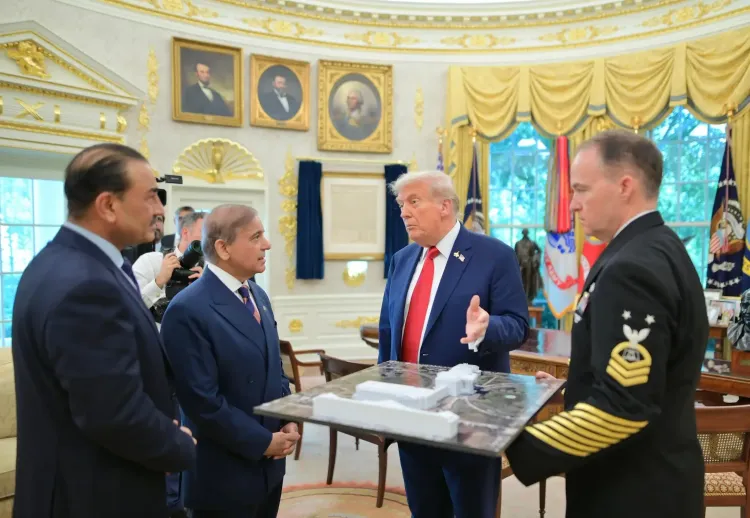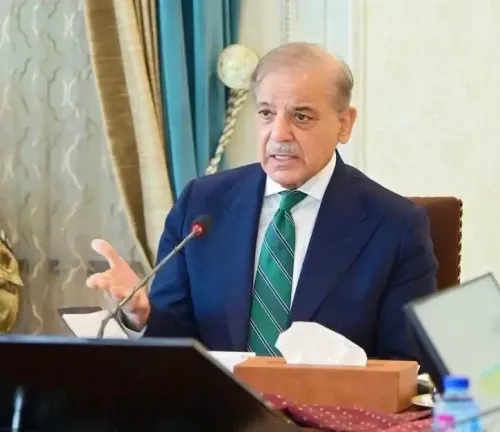Is a Political Storm Brewing in Pakistan Over a Secretive Rare Earth Minerals Deal with the US?

Synopsis
Key Takeaways
- Transparency in governmental dealings is crucial for public trust.
- Provincial governments must be included in discussions regarding mineral resources.
- Article 172 of the Constitution mandates joint ownership of provincial resources.
- Raza Rabbani's stance reflects widespread concerns about federal overreach.
- Public accountability must accompany any potential foreign investments.
London, Oct 31 (NationPress) Reports alleging a deal between Pakistan and the United States (US) concerning the sale of rare earth minerals and potential access to Pasni port have ignited criticism from various quarters. Raza Rabbani, the former chairman of Pakistan's Senate, has openly condemned what he perceives as the federal government's "secretive deal" that undermines constitutional protocols.
A senior member of the Pakistan Peoples Party (PPP), Rabbani has called for an immediate briefing to parliament regarding what he describes as a "new US policy", according to reports.
His statements followed increasing media speculation about a potential agreement permitting a US company to acquire or oversee Pakistan's rare earth mineral assets. Adding to the controversy are indications that the government might be contemplating granting operational access to Pasni, a strategically significant port on Balochistan's Makran coastline, to the US. Observers note that these reports resonate with Pakistan’s historical trend of making strategic concessions to foreign powers during economic crises, often perceived as compromises on sovereignty, as highlighted by Sakariya Kareem in the UK-based newspaper, Asian Lite.
Rabbani not only criticized the lack of transparency but also targeted the fundamental decision-making structure in Pakistan. He accused the federal government of ignoring constitutional mandates, specifically those outlined in Article 172 of the Constitution.
Article 172 clearly states that mineral resources within a province are jointly owned by the federal and provincial governments. Rabbani argued that this shared ownership endows the provinces with both the legal and moral authority to participate in any discussions or decisions regarding the exploration, sale, or leasing of mineral resources, as noted in the report.
Raza Rabbani's comments highlight the strain between Pakistan's federal and provincial governments, particularly regarding resource management. Balochistan, rich in lithium, gold, copper, and other critical minerals, has long accused the federal government of exploitation and neglect. Despite being one of the wealthiest provinces in terms of resources, Balochistan remains economically disadvantaged. Reports indicate that any decisions about minerals made without Baloch representation are viewed locally as yet another act of central dominance. In this context, Rabbani's remarks resonate with the growing discontent among the province's residents, who fear being marginalized yet again.
The federal government’s silence on this matter has only intensified public skepticism. Neither the Ministry of Commerce nor the Ministry of Energy has provided any clarifications regarding whether discussions with the US or any specific US company have progressed to a formal agreement. Meanwhile, government sources argue that such strategic arrangements, particularly those involving critical minerals vital for modern technologies, could attract much-needed foreign investment and technological expertise. However, the lack of transparency and inclusive consultation continues to overshadow any potential economic benefits. Rabbani emphasizes that development should not come at the expense of constitutional processes or public accountability, as stated in the report by Asian Lite.
Rabbani made it clear that the issue extends beyond foreign relations; it touches on internal legitimacy. He reminded the government that the Council of Common Interests (CCI), the constitutional body intended to mediate disputes on shared interests between the federation and provinces, must convene before any mineral-related policies are pursued. According to him, the CCI is not merely a ceremonial entity but a crucial institution designed to ensure cooperative federalism. He also recalled that provincial representatives had previously rejected a proposed minerals law by the federal government, deeming it overly centralized and contrary to Article 172. Thus, circumventing the CCI again would not only be unconstitutional but politically explosive.









